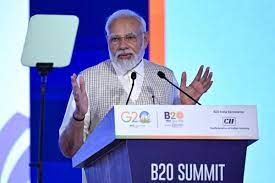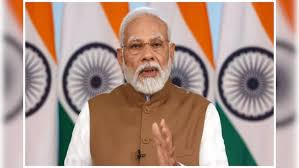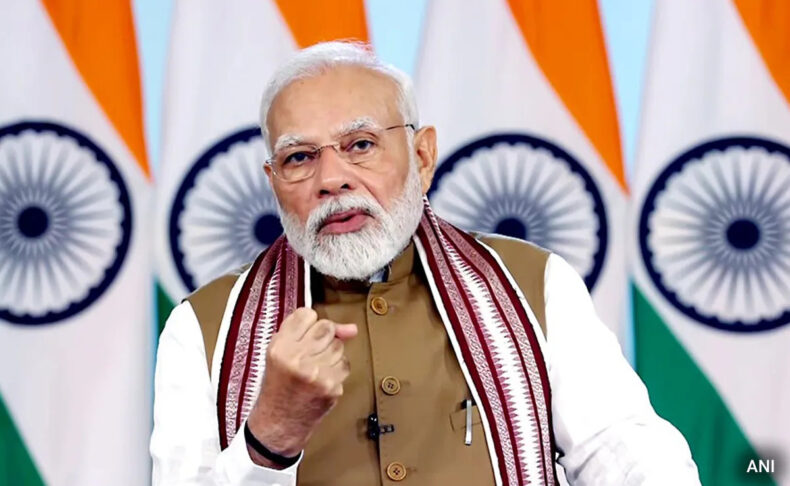According to PM Narendra Modi’s speech at the B20 Summit India 2024, Narendra Modi claims that India has become the face of the Digital Revolution in relation to the era of Industry 4.0. The prime minister also said that India holds a crucial global position in building a foundation-strong and trusted global supply chain.

What does this mean for India?
Prime Minister Narendra Modi delivered a compelling address at the B20 Summit India 2024, held in Delhi this past Sunday. During his speech, he emphasized India’s pivotal role as the vanguard of the Industry 4.0 revolution, underscoring its emergence as a cornerstone of this transformative phase in the global industry. Modi accentuated that the trajectory of international progress is intricately intertwined with the course of global commerce in the years to come.
In his address, Prime Minister Modi further asserted that India stands as a viable solution to the multifaceted challenges that have arisen in the wake of the Covid-19 pandemic. He expressed his conviction that India’s proactive stance will be instrumental in rectifying the intricate disruptions that have manifested on a worldwide scale. Additionally, he emphasized India’s forthcoming leadership in ushering advancements within the global supply chain in the post-pandemic era.
“The global supply chain, once disrupted in times of necessity, can no longer be perceived through the same lens of efficiency,” remarked Prime Minister Modi. He questioned the validity of labeling a supply chain as effective when it falters precisely when its services are most essential. In addressing this concern, he unequivocally positioned India as the answer to this quandary. With firm conviction, he declared that India assumes a pivotal and imperative role in establishing a dependable and streamlined global supply chain, one that engenders efficiency and garners trust.”
Modi went on to pose a thought-provoking question, stating, “The strategy of perceiving other nations solely as markets is a flawed approach that inevitably yields repercussions for the producing countries, be it in the immediate or distant future. The true path ahead lies in fostering a sense of equitable partnership among all stakeholders. It beckons us to recalibrate our perspective and prioritize a business model that orbits around the consumer’s well-being.”
With an ardent appeal, he urged for a more profound contemplation on fashioning business paradigms that revolve around consumer centricity. In this context, Modi underscored that the beneficiaries of such an approach span both individual consumers and entire nations. He emphasized the need to meticulously factor in their interests and aspirations, aligning the trajectory of commerce with their welfare.
Moreover, Modi envisioned the transformation that would ensue with the inception of an “International Consumer Care Day.” He envisioned a metamorphosis in the global discourse as conversations about consumer well-being gain traction, inherently leading to dialogues concerning their rights and protection. Such an evolution, he asserted, could usher in a new era of conscientious economic engagement and heightened consideration for consumer welfare.

What’s his message for business professionals and entrepreneurs?
Narendra Modi later applauded the fact that India has the largest assets of any country, the youth talent and that we have together become the face of the Digital Revolution in the era of Industry 4.0 with connotations to the newly credited success of Chandrayan-3. He also said that business can create prosperity out of potential, turn obstacles into lucrative opportunities and fuel aspirations to achievements. This applies to all kinds of businesses despite scale, and geography as it ensures progress for everyone.
In a resolute stance on prioritizing consumer interests, Prime Minister Modi underscored the necessity of striking a harmonious equilibrium between producers and consumers. He implored business leaders to adopt a resolutely consumer-centric outlook, one that extends its embrace to encompass not only individual consumers but also entire nations. He resolutely emphasized that confining the perspective of other countries to that of mere markets is a myopic strategy, destined to fall short.
The Prime Minister’s clarion call resounded for the establishment of a universally recognized day dedicated to consumers on a global scale. He envisioned a paradigm shift, focusing on “consumer care” instead of the conventional notion of mere “consumer rights.” This transformative proposition anticipates a profound shift in the way businesses perceive and interact with their clientele, fostering an ethos of consideration and commitment towards consumer welfare that extends beyond legal frameworks.
Advocating a resolute commitment to a planet-friendly agenda, the Prime Minister emphasized India’s steadfast dedication to advancing green energy initiatives. He highlighted India’s concerted efforts in harnessing the triumphs of solar energy, with an ambitious aim to emulate that success within the realm of green hydrogen. This strategic move positions India at the forefront of sustainable energy innovation, paving the way for a more ecologically balanced future.













